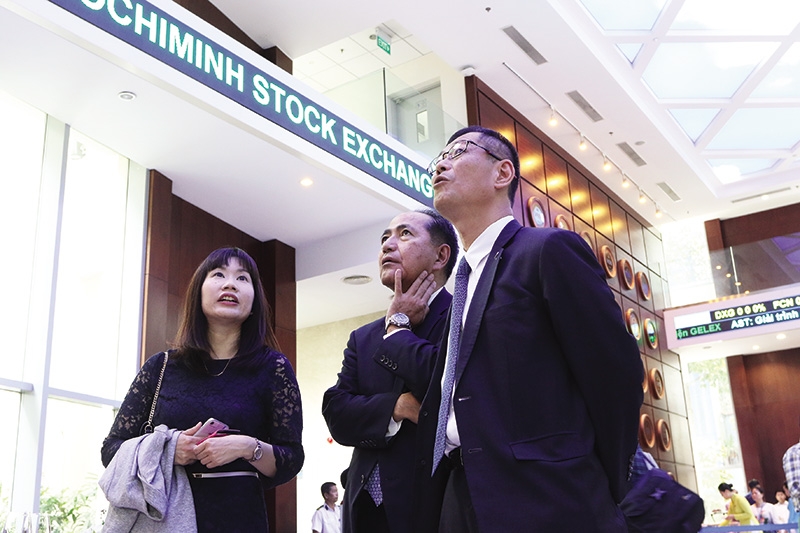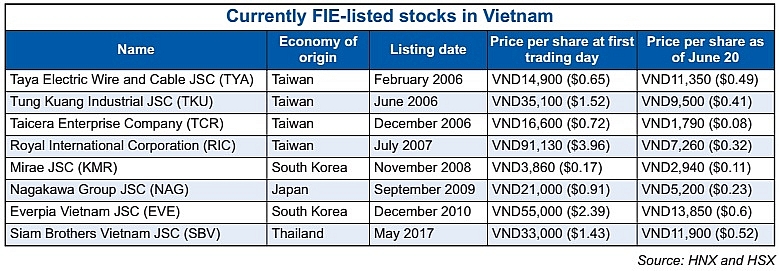Foreign-invested firms eyeing up stock listings
 |
| Foreign-invested enterprises do list in the stock exchanges, but others remain wary while legal frameworks are being coined, Photo: Le Toan |
 |
Last week, the State Securities Commission (SSC) revealed that it is collaborating with relevant ministries and government agencies to accommodate foreign-invested enterprises (FIEs) that want to list on the Vietnamese stock market.
Up to now, lagging regulations have held many FIEs back from their listing plans in Vietnam. Last year alone, there were at least four such companies applying to list on the Ho Chi Minh City Stock Exchange (HSX) and two more aiming at the Hanoi bourse.
The regulatory delay hurts their chances of raising capital in the country, while also negatively affecting the budding image of Vietnam’s market as an open and welcoming space for foreign investors.
One example is Taiwan’s Fortress Tools JSC, the world’s leading manufacturer in gardening tools. Fortress Tools, which plans to list 26.8 million shares, was established in 2006 and has two factories in the northern province of Thai Binh. The company originally wanted to go public last year but market conditions, as well as regulations, were not yet supportive.
“Together with our advisor, we’re finalising the documents for this listing. There are indeed a lot of legal obstacles for FIEs to join Vietnam’s stock market, but we’re grateful to have received a lot of support from local governments,” said Hsu Ting Hsin, chairman of Fortress Tools.
The company, which counts major retailers Lidl and Walmart among its customers, has benefited greatly from the manufacturing shift from China to Vietnam.
Another hopeful newcomer to the market is South Korea’s Seoul Metal Vietnam, a Samsung contractor. Following its listing on the over-the-counter platform in 2017, the company has been open about wanting to progress to list on the HSX as soon as possible. However, similar to Fortress Tools, lack of regulations has postponed Seoul Metal’s plans until now.
Chen Chia Keng, CEO of Phu Hung Securities, believed that as soon as Vietnam improves the legal framework, many more Taiwanese investors will join the local stock market both by investing in Vietnamese companies or listing their own businesses. The brokerage has been active in promoting the country as both the listing and investing destination for companies in Taiwan.
There are two main concerns about listing FIEs in Vietnam that the SSC will need to tackle, according market participants. First, some are worried that FIEs only list their stocks to divest from Vietnam more easily if they need to. This belief is refuted by Tran Thanh Tung, lawyer at Phuoc & Partners. According to Tung, if an FIE wants to exit Vietnam, closing up its business as a limited company is more practical and straightforward than as a listed entity.
Second, many are also concerned that Vietnam’s laws on foreign ownership may have deterred overseas investors from joining the market. Even after Decree No.60/2015/ND-CP on implementing the Law on Securities scrapped this limit in 2015, few FIEs made their debut on the public market. Some speculated that although the general cap has been lifted, the 49-per-cent limit on conditional sectors may have deterred foreign corporations.
However, Vietnam’s stock market has already hosted a number of FIEs. Twelve years ago, the first non-Vietnamese business to list on the HSX was Taiwan’s Taya (Vietnam) Electric Wire and Cable JSC, followed immediately by Tung Kuang Industrial JSC, another Taiwanese manufacturing business.
In subsequent years, textile manufacturers Mirae JSC and Everpia Vietnam JSC from South Korea, refrigeration equipment manufacturer Nagakawa Group JSC from Japan, and Thailand’s Siam Brothers Vietnam JSC also made their way onto Vietnam’s listed market.
The reality is that investors are not familiar with these names, although all of the FIEs hail from countries that have significant business ties with Vietnam. These stocks, which received little attention from both analysts and investors, suffered from falling prices and low liquidity.
Dismal business results have indeed thrown some FIEs out of the market, including Taiwan’s Full Power JSC in 2011, Japan’s Interfood Sharing Company in 2013, and Taiwan’s Chang Yih Ceramic JSC in 2017.
Full Power accumulated a loss of VND740 billion ($32.17 million) before it left the stock market and deleted all of its contact details. Interfood Sharing Company was forced to de-list as it lost VND495 billion ($21.5 million) in three consecutive years on the market. The same fate hit Chang Yih Ceramic, which recorded ongoing losses of VND59.83 billion ($2.6 million) up until its last trading day.
Two FIEs, though, have managed to escape this bleak situation. Everpia Vietnam, for example, has consistently been profitable over the past 10 years, although earnings tend to fluctuate due to high expenses. In 2018, the company posted VND76.2 billion ($3.31 million) in after-tax profits. Another profit-making FIE is Mirae, which posted VND3.76 billion ($163,500) in profits last year. This is half of its 2017 results.
Tran Dinh Dung, head of the Underwriting and Financial Advisory Department at Saigon-Hanoi Securities, told VIR that the SSC needs some more detailed rules on whether the founders of FIEs can divest from their companies, as this is related to the matter of capital outflow from Vietnam.
Regarding the foreign cap restriction, Dung said that the current limit affects both Vietnamese and FIEs equally, so it is not a matter of discrimination against foreign investors.
“In other words, if the foreign business is in manufacturing and other non-conditional sectors, there will be no foreign ownership restriction at all,” said Dung. “On the other hand, if it operates in conditional sectors such as real estate or banking, the foreign entity will indeed be subject to the same cap like listed Vietnamese banks and real estate developers.”
What the stars mean:
★ Poor ★ ★ Promising ★★★ Good ★★★★ Very good ★★★★★ Exceptional
Related Contents
Latest News
More News
- VNPAY and NAPAS deepen cooperation on digital payments (February 11, 2026 | 18:21)
- Vietnam financial markets on the rise amid tailwinds (February 11, 2026 | 11:41)
- New tax incentives to benefit startups and SMEs (February 09, 2026 | 17:27)
- VIFC launches aviation finance hub to tap regional market growth (February 06, 2026 | 13:27)
- Vietnam records solid FDI performance in January (February 05, 2026 | 17:11)
- Manufacturing growth remains solid in early 2026 (February 02, 2026 | 15:28)
- EU and Vietnam elevate relations to a comprehensive strategic partnership (January 29, 2026 | 15:22)
- Vietnam to lead trade growth in ASEAN (January 29, 2026 | 15:08)
- Japanese business outlook in Vietnam turns more optimistic (January 28, 2026 | 09:54)
- Foreign leaders extend congratulations to Party General Secretary To Lam (January 25, 2026 | 10:01)

 Tag:
Tag:




















 Mobile Version
Mobile Version